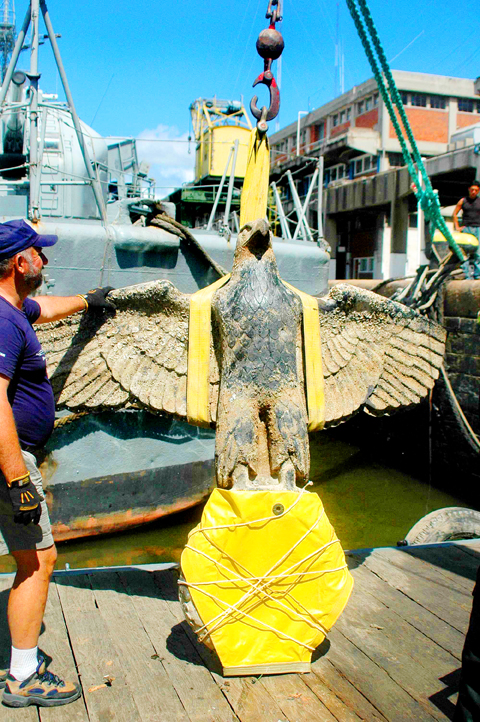The Admiral Graf Spee, the German “pocket battleship” scuttled here in 1939, is caught in the middle of a struggle between the businessman salvaging it and the German government, which wants to prevent its commercialization.
“We always proposed a serious historical and cultural destiny” for the remains of the Graf Spee while “contemplating fair compensation” for the work and investment made to recover its remains, said Alfredo Etchegaray, the businessman.
During a visit to Montevideo last week, German Foreign Minister Guido Westerwelle said his desire was “to prevent the remains of the symbols of the Nazi regime from becoming commercialized.”

PHOTO: AFP/ALFREDO ETCHEGARAY
“What we want really is to reach a constructive deal,” he said, adding that Germany was prepared to support the presentation of the remains “in a historical context, like a museum.”
In 2006, divers hired by Etchegaray recovered an imposing Nazi bronze eagle measuring 2.8m wide by 2m high and weighing 350kg from the stern of the Graf Spee.
Two years earlier, they had come up with a 24.5 tonne rangefinder used to direct the ship’s cannons. And in 1998, a 155mm gun from the ship’s secondary armament was salvaged.
The underwater salvage group planned to bring up more cannons and other pieces of the Graf Spee, but were barred from doing so by an Uruguayan government decree.
After the recovery of the Nazi eagle, with its outspread wings and swastika, Germany sent a note to the Uruguayan foreign ministry claiming ownership of the Graf Spee and opposing continuation of the salvage work.
Etchegaray, who had received permission from the Uruguay government to undertake the salvage work, has spent US$2.5 million over the past 25 years scouring the Rio de la Plata estuary for sunken ships.
The Graf Spee was scuttled by its captain just outside Montevideo harbor where it had gone for repairs after the first major naval battle of World War II.
The Nazi warship was used to raid commercial shipping in the Atlantic until it was intercepted by two British cruisers and one from the New Zealand navy off Montevideo.
Etchegaray claims the wreck was sold in 1940 by the then German ambassador Otto Langmann to Uruguayan Julio Vega Helguera, who concluded the deal as an undercover agent for the British government for £14,000 (US$21,260).
The sale is recorded in the diplomatic dispatches preserved in the Public Record Office in London, a copy of which was provided to reporters by Etchegaray.
Etchegaray said that in 1973 Uruguay issued a decree claiming ownership of all shipwrecks in its waters.
“For the past four years I have been proposing a museum ... or an auction with a prequalification of interested parties and a guarantee of a historic-cultural destination for the [eagle],” he said.

Kehinde Sanni spends his days smoothing out dents and repainting scratched bumpers in a modest autobody shop in Lagos. He has never left Nigeria, yet he speaks glowingly of Burkina Faso military leader Ibrahim Traore. “Nigeria needs someone like Ibrahim Traore of Burkina Faso. He is doing well for his country,” Sanni said. His admiration is shaped by a steady stream of viral videos, memes and social media posts — many misleading or outright false — portraying Traore as a fearless reformer who defied Western powers and reclaimed his country’s dignity. The Burkinabe strongman swept into power following a coup in September 2022

‘FRAGMENTING’: British politics have for a long time been dominated by the Labor Party and the Tories, but polls suggest that Reform now poses a significant challenge Hard-right upstarts Reform UK snatched a parliamentary seat from British Prime Minister Keir Starmer’s Labor Party yesterday in local elections that dealt a blow to the UK’s two establishment parties. Reform, led by anti-immigrant firebrand Nigel Farage, won the by-election in Runcorn and Helsby in northwest England by just six votes, as it picked up gains in other localities, including one mayoralty. The group’s strong showing continues momentum it built up at last year’s general election and appears to confirm a trend that the UK is entering an era of multi-party politics. “For the movement, for the party it’s a very, very big

ENTERTAINMENT: Rio officials have a history of organizing massive concerts on Copacabana Beach, with Madonna’s show drawing about 1.6 million fans last year Lady Gaga on Saturday night gave a free concert in front of 2 million fans who poured onto Copacabana Beach in Rio de Janeiro for the biggest show of her career. “Tonight, we’re making history... Thank you for making history with me,” Lady Gaga told a screaming crowd. The Mother Monster, as she is known, started the show at about 10:10pm local time with her 2011 song Bloody Mary. Cries of joy rose from the tightly packed fans who sang and danced shoulder-to-shoulder on the vast stretch of sand. Concert organizers said 2.1 million people attended the show. Lady Gaga

SUPPORT: The Australian prime minister promised to back Kyiv against Russia’s invasion, saying: ‘That’s my government’s position. It was yesterday. It still is’ Left-leaning Australian Prime Minister Anthony Albanese yesterday basked in his landslide election win, promising a “disciplined, orderly” government to confront cost-of-living pain and tariff turmoil. People clapped as the 62-year-old and his fiancee, Jodie Haydon, who visited his old inner Sydney haunt, Cafe Italia, surrounded by a crowd of jostling photographers and journalists. Albanese’s Labor Party is on course to win at least 83 seats in the 150-member parliament, partial results showed. Opposition leader Peter Dutton’s conservative Liberal-National coalition had just 38 seats, and other parties 12. Another 17 seats were still in doubt. “We will be a disciplined, orderly